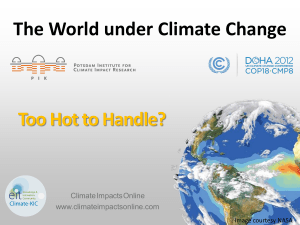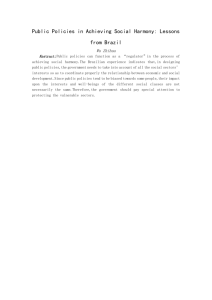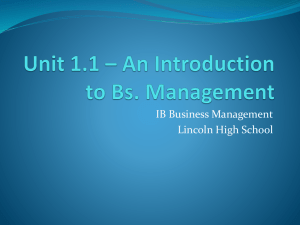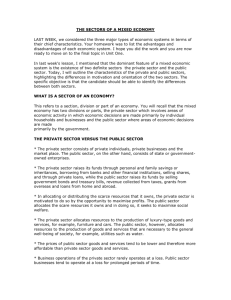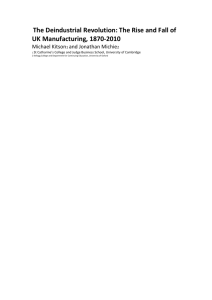Building Trust to Address the Obesity Epidemic Workshop Report November 12-14, 2008
advertisement
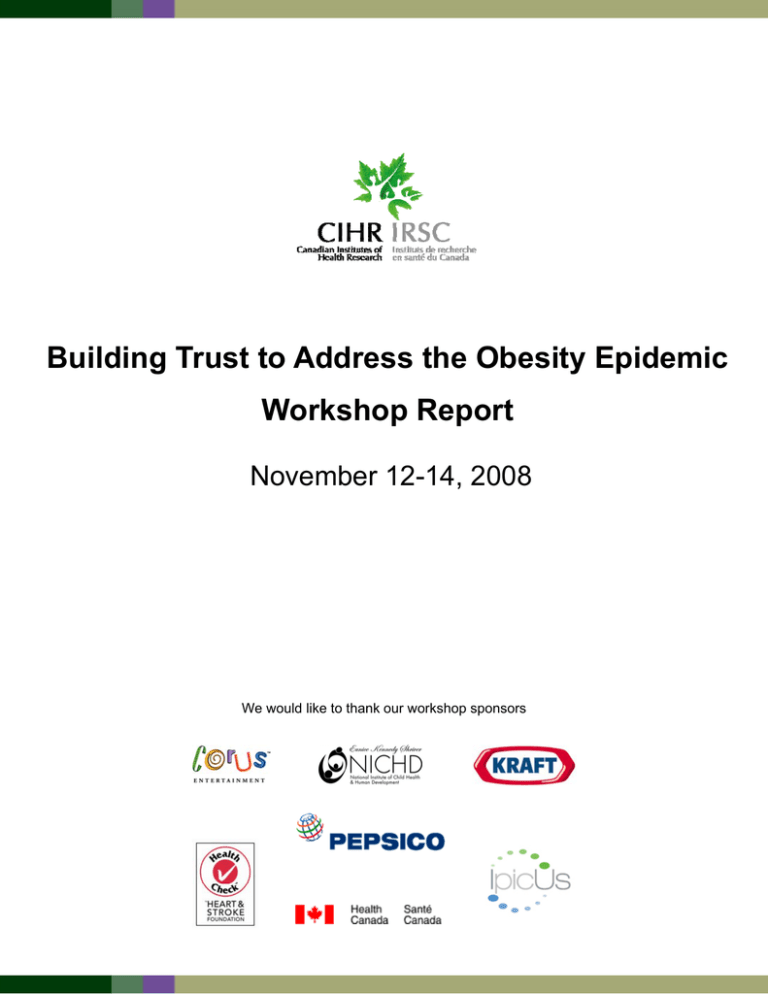
Building Trust to Address the Obesity Epidemic
Workshop Report
November 12-14, 2008
We would like to thank our workshop sponsors
Why hold a workshop on
building trust?
Hundreds of factors combine to give rise to obesity. It is a complex and growing
problem that is now recognized as one of the leading challenges in public health. An
inherent source of this complexity is the fact that comprehensive solutions will require
the coordinated action of many sectors including government, academia, nongovernmental organizations and industry. Unfortunately collaboration between sectors
has been impeded due to an underlying lack of trust.
Although trust is essential to the formation of effective partnerships, it is a concept that
is rarely discussed and is often poorly understood. Solomon and Flores1 make the distinction between simple and authentic trust. Simple trust is un-reflexive; it is total acceptance of trust without hesitation. When broken, simple trust cannot be recovered.
Authentic trust, however, can be built from a foundation of mistrust through commitment
to establishing a continuous relationship. Authentic trust is a conscious choice; it is trust
that can only be reached by actively trusting.
Authentic trust creates new opportunities and allows for relationships that would otherwise be impossible. It can provide a foundation for collaborative partnerships necessary to solve complex social problems. As authentic trust can only be reached by talking about trust, dialogue is an essential step to building trust to address the obesity
epidemic.
Workshop Development
To address the need for this kind of dialogue, forty-four leaders from five countries
and multiple sectors were brought together for a two day workshop in November
2008 to explore building trust for the creation and translation of knowledge relevant
to addressing the obesity epidemic.
This workshop, Building Trust to Address the Obesity Epidemic, was inspired by one
hosted three years earlier by CIHR-INMD and Concerned Children’s Advertisers. This
previous workshop focused on how to foster multi-sectoral collaboration on obesityrelated research. The lack of trust among the sectors emerged as a major obstacle to
collaboration.
The identification of trust as the key issue in collaboration led to planning for a workshop that would move forward the issue of building multi-sectoral trust to address the
obesity epidemic. The aim of the workshop was to create an environment conducive to
communication and cooperation between representatives from the private sector, nongovernmental organizations, academia and government.
Two web-based surveys were used to advance workshop planning in a co-creative
manner. An invitation to provide input into content and participants for the workshop
was distributed widely in spring 2008. We received 83 responses. A second survey to
refine content for the meeting was sent to suggested participants in the summer and
we received 54 responses. These surveys also elicited open-ended responses regarding experiences and perceptions around trust. A list of thematic topics to tackle during
the workshop was distilled from these survey responses (Appendix 1).
The Workshop
The workshop was held on November 12 -14 2008, in King City, Ontario. The key
question tackled at the meeting was “What can be done by individuals from different paradigms of operation to build and sustain trust relationships for the purposes of
creating and exchanging knowledge to improve health?”
The dialogue began with participant-lead discussion groups and break-out sessions
where participants voiced their own experiences with trust and collaboration. In the
12001
Solomon, Robert C. and Fernado Flores, Building Trust in Business, Politics, Relationships
and Life. Oxford
process, barriers to trust, the motivations underlying trust and solutions for getting to
trust were revealed. Following the reporting of these sub-group discussions, the participants heard from several seasoned trust-builders who discussed their experiences and
provided insights into the process of building cross-sector trust. During the final plenary sessions, participants reached a deeper level of conversation on perceived challenges for building trust both within and between sectors. This dialogue revealed unexpected conclusions regarding trust within sectors and provided a major catalyst for
learning. This discussion was a visible demonstration of the group’s movement towards
building trust over the course of the workshop. The workshop concluded with the request that a follow-up meeting be held to build on these advancements. A detailed
agenda of the workshop can be found in Appendix 2.
Strategies for Building
Trust
Throughout the workshop, and within pre-meeting surveys, participants identified actions and attitudes that could serve as strategies to building and reinforcing trust in
successful multi-sectoral collaborations (Appendix 3). Key factors identified included:
Common ground and shared vision: Participants identified the need to align underlying goals and establish a common agenda between sectors.
Leadership: Strong leadership was seen as an essential to motivating organizations to sustain collaborative efforts.
Commitment and Accountability: Trust between sectors needs to be earned.
Proving trustworthiness by honoring commitments and being accountable to
shared responsibilities and values is essential to building trust.
Communication: The importance of effective communication was heavily stressed
by all participants. Communication was seen as the paramount skill required for
the successful implementation of all other strategies for building trust.
Barriers to Trust
Ineffective communication was considered the biggest barrier to building trust between
sectors. Distrust grows as misunderstandings are created and reinforced by lack of
open communication. Misinformation and conflicts of interests were seen as serious
sources of risk when collaborating. These perceived risks discourage open communication and further reinforce the barriers to building trust. Participants identified specific
attitudes and actions that produce misunderstandings that immobilize collaboration,
such as stereotyping the motivations and intentions of other sectors. A list of potential
barriers to trust, as articulated during the workshop and within the pre-meeting surveys, can be found in Appendix 4.
What Drives Me Crazy…
At the close of the workshop a spontaneous discussion emerged on perceived challenges for building trust both within and between sectors. Participants prefaced their
statements with “what drives me crazy about my own sector and about X sector”. An
unexpected conclusion from this exercise was that building trust within a sector may
be as difficult as building trust between sectors. Common themes that emerged as
frustrations both with one’s own sector and in other sectors included:
Stereotyping: Stereotyping other sectors, resulting in unwillingness to consider
new ways of viewing the obesity problem.
Ineffective communication: Communication that is either intentionally dishonest
(misleading advertising) or conveniently polite, but not entirely true. The later
can stem from the fact it is often easiest to say the ‘right’ thing, rather than state
true intentions. Ineffective communication can also result from the unwillingness,
or inability, to engage in meaningful dialogue.
Competition for moral high ground: Preaching the integrity of one sector over others, even when this may be an exaggerated or uninformed claim.
Inefficiency: Inefficiency at turning intentions into action, either resulting from lack
of resources, the paralyzing effects of unrealistic expectations or the misallocation of available resources.
Demands of the Bottom-Line: The inescapable reality of the bottom line; the need
for organizations to remain financially viable regardless of ethical obligations.
Examples of specific things participants voiced as ‘driving them crazy’ about the own
sectors are as follows:
Academia: Academics were frustrated by the tendency for their sector to project
science as an objective truth. They also noted the aggravating tendency for
academics to provide more answers than solutions.
Industry: Food industry representatives felt frustrated by their sector’s tendency
to ‘say things we don’t mean’. Frustration also stemmed from feeling unable to
take risks for fear of jeopardizing the bottom-line or losing potential clients.
They also voiced concerns about the limitations of the short time frames they are
often given to work with.
NGO’s: Members of NGOs were frustrated by the competition for ‘moral high
ground’ that pervades their sector. They identified this ‘holier-than-thou’ mentality as harmful to establishing cross-sector partnerships. They also sometimes felt
limited by a lack of resources.
Government: Participants from government voiced frustrations at their sector’s
frequent inability to communicate effectively with outside stakeholders. They
also bemoaned the slow and often ineffective governmental decision making
process.
Participants across all sectors admitted to the existence of an underlying culture of
distrust within their own sector. Internal competition, for funding and prestige, fuels an
underlying current of dishonesty and distrust between people working within the same
sector. Academic or corporate cultures that reward getting ahead at the expense of
others further exacerbate distrust. This internal disjuncture corrodes the sectors credibility from the inside out, preventing it from presenting a cohesive, trustworthy face to
external partners. Distrust within sectors provides the fodder for the stereotypes, misinformation and misunderstandings that weaken partnerships. Participants agreed that
this internal distrust was the biggest barrier to building trust between sectors; if we
cannot trust our own sector how can we have the tools and attitudes to built trust with
another?
Next Steps
The workshop ended on a positive note with most participants having felt that this was
a productive use of their time. A pre meeting survey revealed participants’ optimistic
attitudes towards building trust between sectors and a post meeting survey indicated
that these attitudes were reinforced by the workshop. Participants expressed a real
desire to start a next round of discussions and truly explore the specific challenges and
realities of building trust. Specifically, participants realized that building trust within
sectors is an essential step in laying the foundation for building trust across sectors.
Understanding the sources and solutions of distrust within sectors was identified as an
important topic for further discussion. Many participants made specific commitments to
moving the dialogue surrounding building trust forward including providing funding
and input to a follow-up meeting.
Appendix 1
Web-Survey Results:
Generating Thematic Topics for Workshop
The initial web survey, Building Bridges Toward Solutions, gauged interest in potential discussion topics and asked the
respondents to suggest further topics that they would be interested in addressing during the workshop. These suggestions were consolidated to create a list of thirteen areas in obesity prevention that were seen as requiring collaborative action. These statements captured main thematic topics suggested by survey respondents and included:
Evaluate industry-sponsored health promotion initiatives
Evaluate government-funded health promotion initiatives
Support public-sector research with private-sector funds
Limit marketing of unhealthy products
Change the balance between food marketing and social marketing
Evaluate adherence to codes of conduct
Develop voluntary codes of conduct in marketing
Develop a shared understanding of corporate social responsibility
Develop a shared understanding of consumer motivation and behaviour
Develop a shared understanding of health claims and their evidence basis
Encourage development of healthier food products
Encourage government action on implementation of healthy public policy
Support school- and work-based education programs
The second web survey, Building Trust to Address the Obesity Epidemic, asked respondents to select the two topics from
the above list of thirteen that they were most interested in discussing during the workshop. The top five topics selected, which became discussion topics during the workshop, included:
Evaluate industry-sponsored health promotion initiatives
Support for public-sector research with private sector funds
Change the balance between food marketing and social marketing
Develop a shared understanding of corporate social responsibility
Develop a shared understanding of consumer motivation and behaviour
During the workshop, participants engaged in a role-playing exercise where they explored the approaches, attitudes, structures, knowledge, and tools necessary for building trust. In this exercise participants were divided into five
small groups, each of which tackled how to ‘get to trust’ for one of above topics identified during the pre-meeting
web survey.
Appendix 2
Workshop Agenda
Key Question: What can be done by members of any sector to build trust relationships for the purposes
of creating and translating knowledge to improve health?
Wednesday, November 12, 2008
16:00
Check-in / Pre-Meeting Survey
Reception
17:30 – 18:45
Dinner
Connections
19:00 – 21:00
Boarding
Auditorium
Welcome / Introductions / Common Questions / Pre-Workshop Survey Results / Agenda Orientation
Moderator: Brad Sperber, Senior Associate and Director of the Health and
Social Policy Practice, The Keystone Group Center for Science and Public
Policy
Presenter: Dr. Diane Finegood, Scientific Director, CIHR-Institute of Nutrition, Metabolism and Diabetes
Thursday, November 13, 2008
07:00 – 08:15
Breakfast
Connections
08:30 – 10:00
Taking Off
Auditorium
Trust in action at Concerned Children’s Advertisers’ Long Live Kids Evaluation Project / Introduction to the Small Group Assignment
Moderator: John Tracey, Director, Swiss Region; Senior Adviser on Public/
Private Partnerships Oxford Health Association
Presenter: Diana Carradine, Director, Concerned Children’s Advertisers
10:00 – 10:15
Break
Foyer
10:15 – 12:00
Ascending
Auditorium,
(Groups may
choose to work
through lunch)
“Get to Trust!” Small Group Assignment
Room 21,
Guided small group discussions for sharing knowledge, wisdom and advice
about trust-building while formulating recommendations for the fictitious
‘Coalition Against Obesity’
Room 22, Of-
12:00 – 13:00
Lunch
fice
Connections
13:00 – 15:00
Airborne
Auditorium
Reports from the small group discussions / Moderator: Dr. Diane Finegood
15:00 – 15:10
Break
Foyer
15:10 – 16:00
Auditorium
Co-Travelling
Comments, questions and advice on the day’s work from three seasoned
collaborators from outside the Obesity domain
Moderator: Dr. Diane Finegood
Panelists:
John Abele, Founding Chairman, retired, Boston Scientific and owner of the
Kingbridge Centre
Dr. Bonnie Schmidt, Founder and President, Let’s Talk Science
Dr. Peter Singer, Senior Scientist and Professor of Medicine, McLaughlinRotman Centre for Global Health , University Health Network and University
of Toronto
16:30 – 17:30
Physical Activity/ Networking Activity
Sports Court
17:30 – 18:30
Dinner
Connections
18:45 – 21:00
Looking to the Horizon
Auditorium
An interactive session on the value of values in building trust in our multisectoral collaborations
Moderator: Dr. Peter Singer
Friday, November 14, 2008
07:00-07:30
Full Breakfast
Connections
07:30-09:30
Descending
Auditorium,
07:30 – 08:30 Participant-Led Topic Discussions, Round 1
Room 22,
08:30 – 09:30 Participant-Led Topic Discussions Round 2
Office
Over the course of the Workshop, participants will create and post topics for
discussion. Participants may sign up in advance OR drop by and join in for
as long as they wish.
For example, Dr. Finegood intends to post at least one, possibly two, topics
following up on the previous evening’s values discussion.
Use this time to get the answers – or to start the discussions – that you
need to round out your Workshop experience.
Continental breakfast will be provided.
09:30 – 10:30
Landing
Auditorium
Reports from the Participant-Led Topic Discussions
10:30 – 10:45
Break
Foyer
10:45 – 11:30
Disembarking
Auditorium
Workshop results / Voluntary commitment-making / Post-Meeting Survey
Moderator: Dr. Diane Finegood
12:00 – 13:00
Lunch and Check-out
Connections
Appendix 3
Strategies for Building Trust
Below is a list of actions and attitudes that can serve as strategies to building trust and establishing successful collaborative multi-sectoral partnerships to fight the obesity epidemic. This list has been complied based on open-ended responses gathered during the pre-meeting web survey (Building Trust to Address the Obesity Epidemic), as well as content of workshop discussions. This list will be used in future discussions designed to build trust.
Willingness to take risks and acceptance that outcomes may not always be perfect.
Using government guidelines to level the playing field within the private sector.
Understanding the needs of other sectors, for example recognizing the requirement of profitability in industry.
Using a ranking or scorecard scheme to review and evaluate organizations progress. This review may rank
progress related to quality standards, ethics, or codes of conduct as set by an external authority.
Communicating openly and honestly with partners.
Encouraging media officers from the different organizations to work to support each other’s efforts.
Starting with small collaborative projects, and build trust up from these experiences.
Establishing shared awareness of the problem.
Willingness to reach compromises.
Setting realistic goals that all partners can reach.
Being self-aware of any assumptions or stereotypes held. Willingness to confront and discuss these biases.
Reliably meeting commitments (deadlines, attendance, performance).
Reinforcing trust with formal documents or contracts where required.
Recognizing advances made by others, instead of needlessly criticizing or demonizing other sectors.
Realizing of the key importance of private sector funding and support to reaching viable solutions.
Working with the private sector in a way that enhances profitability and allows for smart business plans.
Providing honest and frank feedback to collaborators.
Acknowledging the good work of others to foster positive attitudes.
Providing partners a variety of choices on how to proceed.
Conducting social audits to measure an organizations social responsibility. These audits can serve as a way to
measure progress and demonstrate commitment, especially in private-public partnerships.
Willingness to admit potential weaknesses: personally, organizationally or sector-wide.
Establishing protocols on how to disclose conflicts of interest so that collaborative interactions are transparent
Using case studies of successful multi-sectoral partnerships as ‘road-maps’ to collaboration.
Maintaining persistence and patience at developing trust.
Staying open to new ways of doing things.
Openness to feedback of others, whether solicited or not.
Ongoing communication between partners about the planning and implementation of a project. Keeping partners up to date on all aspects of the project as it proceeds.
Focusing on qualitative research as an avenue for engaging diverse perspectives.
Making project decisions collaboratively, through open discussion with partners.
Having leaders with the credibility and experience to bring diverse groups of people together.
Openness to learning from other sectors and disciplines.
Keeping expectations realistic and providing people with an honest way to 'back-down' from commitments they
can't meet.
Involving partners in all steps of the process, from project planning to the dissemination of results.
Utilizing imaginative approaches.
Agreeing formally and explicitly on respective responsibilities, including timelines and deliverables, when entering into a partnership.
Highlighting the positive. Communicating successes, however small, will help motivate further collaborative work.
Having leaders and team members that are enthusiastic and committed to building trust. Putting the right people in the right places.
Giving collaborators reasonable timeframes to transition to new ways of doing things.
Gaining a better understanding of how other sectors work and the challenges they face.
Giving partners full 'ownership' of the collaborative process.
Having goodwill and compassion for others.
Focusing on the reward of greater learning, regardless of actual outcomes of collaboration.
Following-up with all partners involved about the results of a project.
Establishing strong personal relationships with collaborators. Actively getting to know people.
Finding a common ground between partners to build trust upon.
Having strong, influential, visionary leaders.
Openly exchanging information between sectors.
Instituting evidence-based evaluations of the progress and competence of organizations, sectors or specific projects.
Mutually agreeing upon and clarifying the objectives of the project.
Establishing project objectives that benefit all partners.
Formulating agreements between partners on how to collectively evaluate successes.
Establishing the role of each partner in the collaboration, and defining the respective responsibilities of each
role.
Keeping long-term goals in mind when establishing partnerships.
Creating a jointly articulated and agreed-upon code of conduct between collaborators. This agreement can
address ethical issues, such as potential conflicts of interests and issues around data integrity. Such an agreement would be particularly useful in the private funding of public research.
Establishing a common vocabulary between partners/sectors.
Acknowledging the contributions of all collaborators.
Encouraging collaborative efforts industry wide, so that individual companies are not at a competitive disadvantage.
Effectively exchanging and translating knowledge between sectors.
Actively listening without jumping to conclusions.
Communicating directly with partners and avoiding reliance on second hand information.
Creating funding opportunities to support collaborative initiatives.
Holding forums, workshops or events to get people from different sectors talking and exchanging views.
Creating safe environments where collaborators can speak without fear of being judged or stereotyped.
Ongoing dialogue between public sector and private sector funders.
Having complete openness of information between partners ('open-book' policy).
Establishing protocols to evaluate industry sponsored research. These protocols should be established collaboratively and consider the concerns of many sectors.
Creating a climate of mutual respect.
Actively soliciting advice from other sectors and asking a lot of questions.
Defining and aligning the underlying goals of collaborators to establish a common agenda.
Clearly communicating established objectives, polices and responsibilities to all individuals involved in a project.
Establishing a multi-sectoral coalition funded by multiple sectors to help consolidate existing efforts. Such a coalition could serve as a platform for establishing common goals between a wide variety of organizations and
sectors.
Establishing advisory boards of influential leaders who are committed and excited about building multi-sectoral
trust.
Utilizing a third-party facilitator who is trusted by all partners and is able to bring together diverse perspectives and mitigate conflicts.
Establishing a common space to share information and data between partners (ex. a common-portal website).
Acknowledging and discussing any potential ethical barriers to collaboration.
Shifting the paradigms of western capitalist culture so that 'community' is valued over the individual. Changing
the ‘everyone for themselves’ mindset.
Appendix 4
Barriers to Building Trust
Below is a list of actions and attitudes that can be barriers to building trust and establishing collaborative multisectoral partnerships to fight the obesity epidemic. This list has been complied based on open-ended responses gathered during the pre-meeting web survey (Building Trust to Address the Obesity Epidemic), as well as content of workshop discussions. This list will be used in future discussions designed to build trust.
Tendency to point out failures and not celebrate successes. For example, academia critiquing the food industry,
without acknowledging its positive advances.
Stereotyping the intentions and behaviours of other sectors.
Unclear standards or expectations.
Lack of open debate between sectors.
Stereotypes of government as not understanding competitive nature of business.
Lack of research that holds credibility across all sectors.
Stereotypes of food industry, including assumptions that the food industry cannot self-regulate due to inherent
conflicts of interest.
Voicing negative and potentially untrue things about other sectors or organizations; spreading rumours.
The priority of producing profits and remaining finically viable. The inescapable reality of the bottom-line.
Physical separation of potential collaborators, for example researchers and clinicians working in separate
buildings.
Past breaches of trust tainting future relationships.
Tendency to participate in collaborations just to get credit, not to contribute meaningfully to the project.
Punishing, or not rewarding, collaboration within current systems (business systems, academic system).
Failing to follow through on commitments and responsibilities.
Negative portrayal of the food industry by the media.
Misunderstandings based on lack of information.
Failure to share and understand alternative perspectives.
Misrepresentation of health research in the media.
Misinterpretation of the well-intended actions of others.
Intentionally, or accidently, providing others with inaccurate information.
Lack of sensitivity to others perspectives.
Unreliable, unsustainable resources available to the public sector.
Poor understanding about the expertise offered by other sectors.
Misleading marketing by industry under the guise of being socially responsible.
Conflicting interests between partners/sectors.
Lack of imagination.
Lack of good 'road maps' or case studies to model successful multi-sectoral collaborations after.
Poor communication skills.
Lack of common language between partners/sectors.
Stereotypes of nutrition scientists as always 'changing their minds'.
‘Jumping to conclusions’ and disagreeing without discussion.
Internal competition within sectors (turf wars, competition for scare resources).
Competition for funding and public support between sectors.
Inflexible positions or roles.
Lack of recognition that different sectors evaluate success differently.
Inflexible agendas.
Inconsistent values within an organization or sector.
Inability to take risks, especially within the private sector.
Fear of stepping outside ones comfort zone.
Inability, or unwillingness, to articulate your true motivations to others.
Ignorance of the benefits to trust and collaboration.
Holding negative emotions, such as fear or anger.
Group mentality; unwillingness to challenge the status quo.
Fickleness of government policies due to changing party platforms.
Fear of not receiving proper acknowledgement for ones contributions.
Unwillingness to share power.
Inadequate, or unsupportive, leadership.
Fear of damaging ones reputation, for example researchers not willing to collaborate with private industry out
of fear of damaging their reputation.
Large egos.
Disorganization of efforts and resources within a sector.
Changes in leadership or team membership.
Dismissing value of qualitative data, thereby potentially missing opportunities to engage alternative perspectives.
Fear that collaborations will impose new limitations (especially limitations on business strategies).
Belief in superiority of ones own sector over all others.
Differing objectives and goals between partners.
Fear of being taken advantage of.
Stereotypes of public health organizations as impractical or radical.
Not articulating or realizing the differing agendas and goals between partners.
Desire to protect ones status and job and fear stepping outside the status quo will compromise them.
Desire to entrench power and advance personal status.
Defensive narratives that prevent openness to new perspectives.
Deep-set anti-business paradigm prevalent within Canadian culture.
Criticizing others, without offering solutions.
Conflicting priorities between partners/sectors.
Closed mindedness to change.
Prevalence of business strategies which are not conducive to collaboration.
Conflicting values between partners/sectors.
Biases against industry funded initiatives.
Focus on getting to 'end' product, rather than on building relationships.
Behaving in ways that do not correspond to verbalized intentions.
Acting in self interest only.
